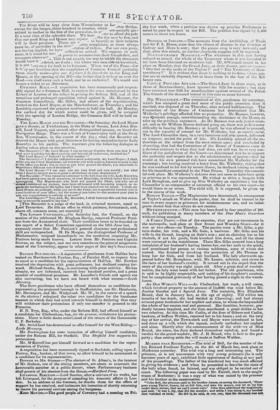MR. WELLESLEY.—The committal of this gentleman for contempt, which has
occupied a great deal more of the public attention than it merited, was disposed of on Thursday, after several half-hearings. The Committee of the House of Commons had determined that Mr.
Wellesley's privilege afforded him no protection. Mr. Beanies, however, was Quixotic enough, notwithstanding the disclaimer of the House, to take up the privilege argument. As Mr. Beanies was only junior coun- sel, and as Sir William Horne declined going on, there was at first some difficulty in hearing Mr. Beames ; at length he was allowed to proceed, not in tire capacity of counsel for Mr. Wellesley, but as amicus curios. The Lord Chancellor then, in a very luminous and able speech, delivered ea" tempore, settled the point of law. His Lordship quoted all the au. thorities on the subject from the most remote ages ; and concluded by observing, that had the Committee of the House of Commons come to a decision contrary to what they had done, yet still was he so very con- fident of the jurisdiction of the Court—so determined was he to support the authority and respect due to the administration of justice—that he would at his own personal risk have committed Mr. Wellesley for the contempt ; but having received a letter from Mr. Wellesley, stating that he was confined to his bed by severe illness, he declined issuing an order for his immediate committal to the Fleet Prison. Yesterday die commit- tal took place. Mr. Wellesley's sickness does not seem to have been quite so grievous as it was represented. He wished to drive a bargain with Lord Brougham, and to give up Miss Wellesley on conditions ; but the Chancellor is no compounder of contempt offered to his own court—he would listen to no terms. The child will, it is supposed, be given up in the course of the week.
ROBERT TAYLOR.—The Magistrates have determined, in consequence of Taylor's attack on Walter the gaoler, that he shall be treated in fu- ture in every respect as prisoners for misdemeanour are, and no indul- gence shown him that others do not receive.
HETHERINGTON.—This man has been fined in four penalties of 201. each, for publishing as many numbers of the Poor Man's Guardian without being stamped.
A FAMILY PARTY.—One of the exposees, that are not uncommon in the metropolis, took place at Bow Street and Worship Street—for it
was at two offices—on Tuesday. The parties were a Mr. Giles, a pic- ture-dealer, his wife, and a Mr. Gale, a barrister. Mr. Giles met his wife in the Strand, hanging on Gale's arm ; and on claiming her as his chattels, if not his goods, Gale knocked him down, and all the three were conveyed to the watchhouse. There Mrs. Giles entered into a long complaint of her husband's having beaten her, cut her nails to the quick, and prostituted her person to various noblemen, some of whom she named. She finished by invoking the protection of Mr. Thomas to keep her for Gale, and from her husband. The lady afterwards ap- peared before Mr. Broughton, with Mr. Lester, solicitor, and swore to the facts of her husband's cruelty. It turned out in the sequel that the story of the cruelty was eight years old. After a great deal of recrimi- nation, the lady went home with her father. The old gentleman, who is said to be highly respectable, said nothing of his daughter's conduct,
but he complained grievously of having passed a night in the watch- house.
AN OLD WomsN's WILT..—At Chelmsford, last week, a will cause, which involved property to the amount of 15,0001. Was tried before Mr. Justice Gazelee and a Special Jury. The testatrix, Mrs. Elizabeth Brand, died in January last, at the age of eighty. Till within ten months of her death, she had resided at Clavering; and had always evinced great fondness for her nepli.eW and niece, to whom she bequeathed the whole of her estates real and personal. Her facultieS, however, gra- dually became impaired, and she then manifested a great dislike to her two relatives. At this time Mr. Catlin, of the firm of Gibson and Catlin, bankers, of Saffron Walden, removed her to his house; and on the very day of her arrival, the Town-clerk and Mayor were introduced to her, and drew up a will, which she signed, entirely excluding her nephew and niece. Shortly after the commencement of the evidence of Miss Brand, the niece, the Jury declared themselves satisfied, and found a verdict for the grand-nephew, Mr. J. H. Brand, who is heir to the pro- perty; thus setting aside the will made at Saffron Walden.


























 Previous page
Previous page